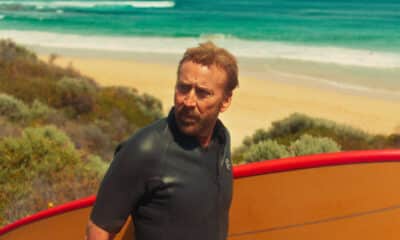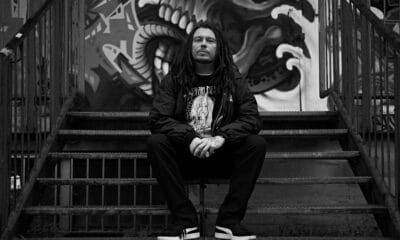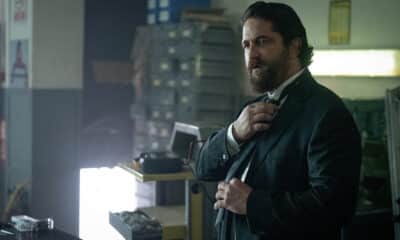
Interview with Director Royce Gorsuch for Mindhack
Mindhack screened earlier this year at Frightfest. The film offered a respite from the typical horror offerings, adding a science-fiction spice to the festival. Originally known as Mad Genius, Mindhack joins computer genius Mason (Chris Mason) as he researches into hacking the human brain. His end goal – to unite the world, eliminate war and create peace for all mankind. It’s a quirky story, brought to life by writer / director Royce Gorsuch.
Gorsuch had been making a living as a director for several years, his body of work mostly based within the advertising world. With Mindhack he decided to branch out from the naturalistic day job of commercials into the hyper-stylised world of cyberpunk. Royce has long been a fan of the movement and cites William Gibson’s Neuromancer as one of his favourite novels. We caught-up with the new feature filmmaker at Frightfest to find out all about Mindhack‘s journey from script to screen.

Interview with Director Royce Gorsuch for Mindhack
Frightfest film festival embraces not only horror but all things ‘dark heart of cinema’, how does Mindhack fit in?
To be honest, it was surprising, their enthusiasm for the film, which was really welcome because I love the horror genre. I love the dark heart of cinema, a noir, and a dark film. I love seeing into worlds that are just heightened reality beyond what we experience everyday and I think that that is the essence of cinema really to me, is that window into a new world. I think that’s what this festival offers and it gets people excited and their adrenaline going. Their dark fantasies scratched at and for my film, what I was trying to do was to encase my digital native generation with this ethos that you can change the world from your garage and put it into this element of mind-hacking and bio-engineering that is currently taking place in laboratories around the world and kind of asking is this the right thing that we should be doing? I think that there’s pros and cons, goods and bads and really ultimately at the end of the day human beings are animals. Should an animal have this power (chuckles) with all of our flaws. That’s why in the film it starts off and you get involved with the main character and you’re like oh he’s on this righteous mission, and then soon you discover that he’s actually a mad man and has so many flaws, too many to list and there might be other elements outside of him that are forcing him into this insane journey. But it’s also a part of him so it’s like this multi-layered character universe that is about the human condition and technology. I don’t give any answers, I’m not trying to tell you one way or another what’s right or what’s wrong I’m just creating something that I hope gets people to think. That’s really what the film is for. I love films that make me think and I love films that make me try to add up the story and the message and the theme. As blockbuster films become more globalised they have become more generalised and most theatrical cinema is really aimed at pleasing everyone and therefore they really make it as clear as can be, it’s a plus b equals c. There’s a formula and it’s great and those kind of films are amazing, but with this film I had an opportunity to just make what I wanted without any ‘adult supervision’ if you want to call it that. I wanted to make something that could be interpreted and that people could question. It’s amazing because I get… in my early audiences I’d have people call me a couple of days later and tell me that they were still thinking about the movie or they spent an hour after the film talking with their girlfriend about it. That’s the best response I can get.

Interview with Director Royce Gorsuch for Mindhack
The film is full of coloured filters and neon lighting, would you say that this is your usual aesthetic or was it just to convey the mood of this film?
I worked in commercials earlier for several years before the film and I was actually doing a completely different style. In those commercial works they were documentary-style, very natural, natural light, real humans – non-actor style. So this film Mindhack is completely the opposite of that. It’s totally lit, it’s hyper-real, it’s not real, it’s scripted…it’s all those things that my old work was not, and I actually really love both styles. Mindhack was really a place for me to explore doing more hyper-real, sci-fi cinema, which is what I ultimately want to do. I did bring in some of the elements of my documentary work into Mindhack, in certain scenes to make it feel more real, to make it feel more intense and sometime we’d do very classic framing. But in terms of colour and lighting, I’m a huge fan of cyberpunk. I love cyberpunk, Neuromancer by William Gibson is my favourite book, it’s influenced me my entire life. This was a place that I finally got to explore that on my own terms. It was a very purposeful decision to go with the colouring that we did because I wanted to make the world feel sort of extra real and I didn’t have a very big budget and it’s a sci-fi film and so the way that we could do that was with our colour and our lighting. The way that I view the film also is that I always thought about it as a mini-graphic novel, that is the hidden graphic novel on the shelf. It’s not the blockbuster Marvel title but is like a cool little comic book, and that’s the way that we lit it and the way that we cast it in a way. That was kind of the ethos of the film, we’re making a mini-comic book movie and that’s the way we shot it.

Interview with Director Royce Gorsuch for Mindhack
You have Chris Mason as Mason and then Scott Mechlowicz as the inner voice brought to life. Was there ever any thought about having Chris play both halves, or did you always want it to be two people?
The two selves, the two halves that are portrayed in the film I always imagined as two separate people. Once we got into pre-production and we had some financing we did play with a lot of the scenarios; what if it was the same person? What if they were even a different ethnicity? What if, what if, what if? We played with a lot of things and ultimately it came down to just who were the best actors. I also love the trope of buddy comedy or dual protagonists, I really love that stuff and that was something that really showed through in the script, the dialogue between those two and so making it two different actors really brought that to life. It would be really challenging for a single actor to play that against themselves. Of course Tatiana Maslany in Orphan Black is like the most brilliant actor in the universe and can do that, but I really enjoy Chris and Scott together and I think that the right choice ultimately. They were just so good together. Plus the two selves are really different people, the way that I wrote the story arc is that they cross. So in the mid-point of the film when Finn is bought to life that’s when things cross and their arcs cross each other and it just made sense to have it as two personas. As you learn later more people in the film that you have met are also other persona. That’s the fun, you go back and try to add up who was what.
How did you get your cast together?
The casting was a really interesting process, I’ll just be completely transparent, we had a little bit of money to get this thing going and the number one choice I made was to bring on Tineka Becker as the casting director. She had been a casting associate on huge movies like X-Men and she’d also cast indie films. I knew her through a personal relationship and she came on and just took ownership on the casting of the movie. She bought me people I had never even heard of, like Chris, she pulled out Scott and all these other actors that I was just blown away by. We were getting to see these people and we were literally classified as ultra-low budget movie in SAG terms. So we’re paying very little money. I asked her how we were getting these people interested? They’ve been in major movies and Sundance films, she said ‘they read doctor dramas and cop dramas every week, and this is something that’s new and interesting’. I had a director reel that showed I knew what I was doing and it was a cool script and she said ‘that’s what actors want to do, they want to act in cool stuff.’ From Spencer (Locke) to Chris to Scott to Faran (Tahir), Brandon (Scott), Tehmina (Sunny), they’re all just amazing and I’m humbled that I got to work with them in my crazy little movie. That was one of the most fun and fascinating parts of the whole process, which was counter to my commercial work where I had been working with real people. Sometimes I’d work with real talent like Olympic gold medallists, which was awesome, but it wasn’t like this. I have so much respect for actors. I took a year of acting myself, the Meisner technique, just to learn from their point of view. How they view material and how they relate to it. Meisner’s very specific, but it was very eye-opening how difficult how acting is. Viewing from the outside in it looks easy, but it’s tremendously difficult to carry a movie. It was an awesome experience.
So what were you’re inspirations? You mentioned Neuromancer earlier, is there anything else that influenced the look or the feel of the film?
Definitely my favourite filmmakers influenced me greatly. Christopher Nolan, David Fincher and Darren Aronofsky, I’d say are probably the top three, that I stole from (laughs) or tried to emulate in different ways. Really the cyberpunk genre itself, I felt when I started this project in 2015, I looked at the landscape of the market place and film media and I said ‘there hasn’t been a cool cyberpunk film in a while’. Something that really captured the ethos of that genre and I get into it and things start moving forwards. It was so funny, right when we got into pre-production Mr Robot, the TV show, came out (laughs) and it was so similar to my movie it was uncanny. I said ‘Oh my God, there was the missing puzzle piece in the zeitgeist’, I felt both relieved that we were on the right track, and a little jealous that I was’t out first. I really tried to go with the tropes of cyberpunk and really it was ultimately about trying to create this little comic book material movie. Something that had an independent voice, but with bigger aspirations.

Interview with Director Royce Gorsuch for Mindhack
Mindhack has a very accurate depiction of obsessive nature of computer coders, the whole tunnel vision thing…
Totally. You’ve totally got it. Because I think it’s possible with computers because we’ve basically created this module that allows us to pour our thoughts and creation into a device that can actually create our wildest fantasies, that’s what a computer really is. It can become all consuming. I think about that a lot, how the future of our world – when they put an I-Phone in your brain and you’re able to get onto the internet whilst you’re sitting in a cafe without any device around, or you’re able to venture into a virtual reality – which is going to happen, there’s no question, what does that mean? What will it do to our humanity? How will people operate? It’s a really fascinating subject that I just could endlessly explore and is partly what my new show is about. I completely agree and also I saw the protagonist’s goal in Mindhack similar almost to mine of making the movie. It was all that I did, I was completely obsessed, singularly focused. I basically put my career on hold, financially I moved into the warehouse that we shot the movie in. I lived in Downtown LA. I became a part of that underground warehouse culture and the scene of it. I hired people from that world to make the movie. One of the most amazing collaborations I got to have was with Jared Tate Johnson, he actually is the creator of that warehouse that has all the hacking in. We call it the Hacker Enclave. That was his personal curated space that he designed from scratch. It has crazy staircases going off of it in different directions like an M C Escher house, there’s like five people living there as a artist / hacker community, he came on thankfully to be our production designer. He brought his whole aesthetic to the world. He was one of my favourite collaborations because he is that world and I was able to be a part of it with him. It was really amazing, and what he was able to create with like the $5 he had – the computers, the hackers space, all the different devices – are all attributed to Jared.
What’s next after Mindhack?
I’m back to directing commercial work and I’m also writing a new episodic series, cyberpunk series. It’s very cool, it’s very similar to the film. Sort of a bigger, better version of it. I would say more accessible to a greater amount of people. I’m really excited about that.
Mindhack screened as part of Frightfest 2017, a UK release date is still to be announced.
Kat Hughes is a UK born film critic and interviewer who has a passion for horror films. An editor for THN, Kat is also a Rotten Tomatoes Approved Critic. She has bylines with Dread Central, Arrow Video, Film Stories, and Certified Forgotten and has had essays published in home entertainment releases by Vinegar Syndrome, Arrow and Second Sight. When not writing about horror, Kat hosts micro podcast Movies with Mummy along with her six-year-old daughter.

Latest Posts
-
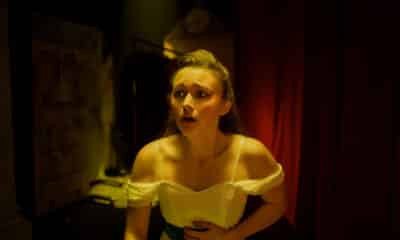

Film Reviews
/ 2 days ago‘Fear Street: Prom Queen’ review: Dir. Matt Palmer (2025)
It has been four years since Leigh Janiak’s Fear Street trilogy took horror fans...
By Kat Hughes -
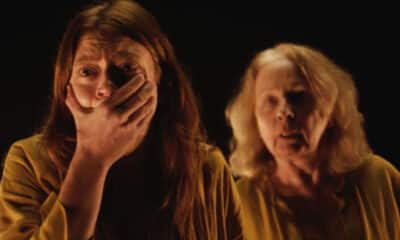

Film Reviews
/ 2 days ago‘The Surrender’ review: Dir. Julia Max (2025)
As Julia Max’s debut feature, The Surrender, unfolds, the inspirations for the film become...
By Kat Hughes -


Film Trailers
/ 4 days agoFirst trailer for Darren Aronofsky’s ‘Caught Stealing’
Sony Pictures has released the debut trailer for Darren Aronofsky’s new film Caught Stealing,...
By Paul Heath -
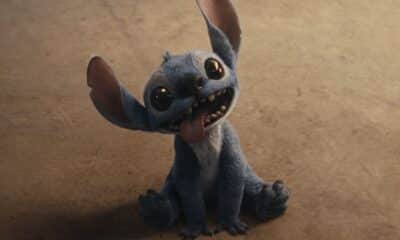

Film Reviews
/ 5 days ago‘Lilo and Stitch’ review: Dir. Dean Fleischer Camp (2025)
Director Dean Fleischer Camp won audiences over with the fantastic Marcel the Shell with...
By Kat Hughes
